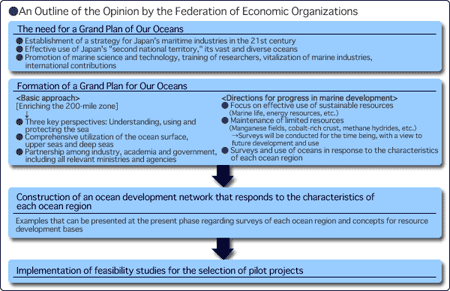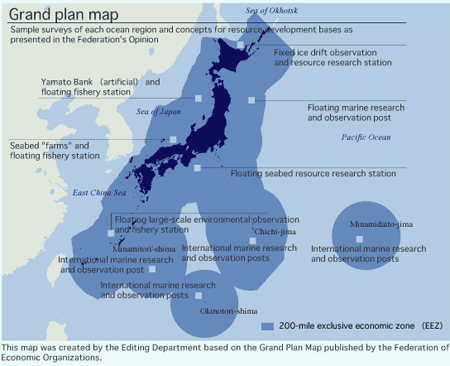- Top
- Publications
- Ocean Newsletter
- An Opinion of the Japan Federation of Economic Organizations "The Grand Plan of Our Oceans for the 21st Century" - The formation of an ocean development network for our country's 200-mile zone -
Ocean Newsletter
No.1 August 20, 2000
-
An Opinion of the Japan Federation of Economic Organizations "The Grand Plan of Our Oceans for the 21st Century" - The formation of an ocean development network for our country's 200-mile zone -
Hironobu HASHIGUCHI
Kawasaki Heavy Industries, Ltd., Managing Director, Senior General Manager of Technology Group Japan Federation of Economic Organizations, Marine Development Board, Integration Department Chairman
Selected Papers No.1The Japan Federation of Economic Organizations has put together a proposal in regard to the future of Japan's marine development, recommending it to government and distributing it to related parties. It is a network formation plan for the practical use of Japan's 200-mile zone through the concepts of "understanding", "wisely using" and "protecting" our ocean and coastal resources.
Selected Papers No.1 -
The Promotion of an Environment that Builds an 'Ocean Sense'
Takashi HAMADA
Professor, The University of the Air Chairman, Japan Science AssociationFormerly, similar to how the beauty of the word "Nagisa" (coastal environment) was naturally a part of Japanese lifestyle, some kind of 'ocean sense' or natural consciousness of the oceans existed in Japanese society. Now in a highly informative society, we have entered an era that has transformed oceanography into an ever-expanding ocean science. Yet, sadly so few people seem to have that 'ocean sense'. -
The Urgent Need for a Comprehensive Approach to Ocean Issues
Hiroshi TERASHIMA
Exective Director, The Nippon FoundationSince the United Nations Convention on the Law of the Sea took effect in 1994, countries around the world have acted on their obligation to address problems concerning the ocean. World attention has also focused on the effective implementation of the Agenda 21 action plan. Against this background, we must admit that Japan's efforts appear at best lackluster. What is urgently needed, is a ministerial level board for the establishment of an ocean policy as well as a coordinating Ocean Policy Office to put their deliberations into practice.
An Opinion of the Japan Federation of Economic Organizations "The Grand Plan of Our Oceans for the 21st Century" - The formation of an ocean development network for our country's 200-mile zone -
The Japan Federation of Economic Organizations has put together a proposal in regard to the future of Japan's marine development, recommending it to government and distributing it to related parties. It is a network formation plan for the practical use of Japan's 200-mile zone through the concepts of "understanding", "wisely using" and "protecting" our ocean and coastal resources.
In July 1998, I was appointed chairman of the Integration Department, a body that reports to the Marine Development Board (Hiroshi Ohba, Chairman) of the Japan Federation of Economic Organizations ("the Federation"). Since my appointment I have held many discussions with a wide range of related parties regarding directions for Japan's marine development. In March 2000, related government ministries and agencies formulated the "National Strategies for Industrial Technology" for marine development, on which occasion I listened to the opinions of officials from the various ministries and agencies and academic leaders entrusted with the careful study of these Strategies. The Opinion listed in the title above was compiled on the basis of those views by the Integration Department. Following the deliberations of the Marine Development Board, the Board of Directors of the Japan Federation of Economic Organizations formally adopted this Opinion on June 20, 2000 and distributed it to various circles as a proposal.
The origins of the Federation's efforts in marine development date to 1968, when the Marine Development Discussion Group was launched to begin the examination of approaches to marine development. In 1971, the Japan Marine Science and Technology Center (JAMSTEC) was established, in response to a proposal by the Federation. Through the efforts of this body, Japan acquired and began operating a range of necessary hardware, including deep-sea research-vessel systems, committing resources to the pursuit of marine scientific research and making a meaningful contribution even internationally. The Marine Development Discussion Group was reorganized in 1981 and renamed the Marine Development Board, and has continued since then to table a steady stream of proposals to promote marine development.

Additional efforts are conducted under the auspices of the Council for Ocean Development. The Council for Ocean Development, a consultative body reporting to the Prime Minister, deliberates and gathers proposals on general, fundamental issues regarding marine development. In 1998, the Marine Development Commission proposed four core themes for marine development: resources (living things, energy and minerals), use of space, environment, and science and technology, advocating development in each of these areas. At the present time, however, ongoing marine development activities are largely confined to the establishment of plants in coastal areas through land reclamation and upgrading of ports and fishing harbors.
Japan is dependent on imports for 80% of its energy and 60% of its foodstuffs. Yet although Japan's land area is only 380,000 square kilometers, the nation boasts a 200-mile exclusive economic zone (EEZ) encompassing 4,470,000 square kilometers-the sixth largest in the world. The purport of the present Opinion of the Federation of Economic Organizations is that the nation must examine ways of putting this 200-mile maritime zone to more effective use in the 21st century.
The first problem is Japan's fisheries resources. Although Japan has crafted an advanced position for itself in the development of its coastal fishing industry, this industry is said to be reaching the upper limits of possible development, due to the deteriorating quality of water. If the area in which this fishing industry is cultivated could be extended to the full 200-mile limit of the EEZ, fisheries resources could be used as a renewable resource, leading to a significant increase in the volume of resources. This development would also contribute significantly to the solution of Japan's food supply problem, as well as the problem of feeding the earth's swelling population. Thanks to recent technological developments, the technology required to fix large-scale structures in remote-sea locations is being established. Moreover, renewable energy sources such as solar and wave power can be used to enrich sources of nutrients. By raising clean, cold water from the ocean depths to the surface, new fishing grounds can be formed.
The next important area is the environment. Cultivating seaweed, to complement afforestation and other "green" efforts on land, can increase the absorption of carbon dioxide; this seaweed can also be used as biomass for clean energy generation. By placing fixed-point observation posts at several locations in the ocean, a network can be formed with satellites to transmit data in real time. Such information may prove invaluable in the search for a solution to the problem of global warming.
Another valuable initiative would be to install resource-survey bases that can survey the potential for use of methane hydrates, cobalt-rich crusts and other mineral resources. In addition, seismic monitoring stations and ocean-current observation posts can contribute to Japan's security.
To provide conceptual examples, the Opinion selects seven maritime regions and lists examples of specific potential bases. The Opinion proposes that a feasibility study be conducted with respect to these bases, followed by the selection of a suitable pilot project on which to conduct demonstration tests.
To invest astutely in Japan's stock for the future, the Federation believes that a part of the national budget must be applied to the effective use of the 200-mile zone. Moreover, if Japan can succeed in leading the world in technology for the effective utilization of marine resources, the results would contribute significantly not only to Japan but also to the entire world.
Other means of harnessing marine resources exist as well. Some parties have proposed the location of waste-processing facilities and nuclear power-generation facilities on the ocean; however, it is the Federation's view that merely shifting these problems from land to sea is not tantamount to solving them, so these suggestions are not reflected in the Opinion. Other projects for use of coastal regions are provided for in the budget and are already well under way. In these cases, the Opinion advocates "extending the purview of these projects to include the oceans as well as the coast, promoting comprehensive management that embraces development, use and preservation."
The preceding table offers an outline of the Opinion. The entire text of the Opinion can be viewed in Japanese from the Federation of Economic Organizations website. The URL is as follows: http://www.keidanren.or.jp
The Federation is holding continuing discussions on the basis of the Opinion and hopes that joint national projects can be launched with the agreement of the industrial, government and academic sectors.


